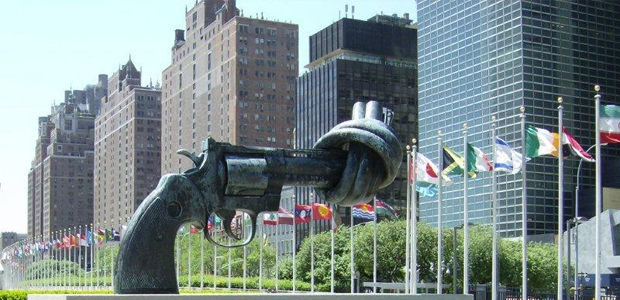Every day, men, women and children around the world are killed, maimed and terrorised as a direct result of the irresponsible international arms trade.
In the UN General Assembly, 154 states voted to adopt the treaty just days after Iran, North Korea and Syria – three human rights-abusing countries under some form of UN sanctions – staged a cynical move to try and block it. All three voted against the treaty and 23 other states abstained. Powerful lobbies in the US and other countries also tried to stall progress.
“An overwhelming majority of the world’s nations has decided to stand up for human rights, to make it more difficult for deadly weapons to be diverted into the illicit market”, said ITUC General Secretary Sharan Burrow. “World military spending in 2011 is estimated to have been $1,738 billion [1], money that could have been spent on peace building and building sustainable societies and ensuring that the priorities of government, workers and companies are focused on economic and social development,” she added.
“When you think of the huge economic interest and the political power in play for the big arms producers and exporters, this treaty is a tribute to both civil society, which championed the idea to save lives and reduce human suffering, as well as the governments who heeded that call,” said Widney Brown, Senior Director of International Law and Policy at Amnesty International.
The ITUC adopted at its 2010 Vancouver Congress a Resolution on Democracy, Peace, Security and the Role of the United Nations calling for “effective international regulation of the production and trading of arms” and supported a “UN Arms Trade Treaty to regulate the trade in small arms”.
The treaty will be opened for signatures and ratification on 3 June 2013 at the UN General Assembly and will enter into force shortly after it has been ratified by 50 states.
"This advance should be seen as a step on a long road towards a more peaceful world. New tensions within and between states, some of them already breaking into armed conflict, pose a serious and on-going threat. The international community needs to build on this achievement to take further and deeper steps for disarmament and peace," said Burrow.


